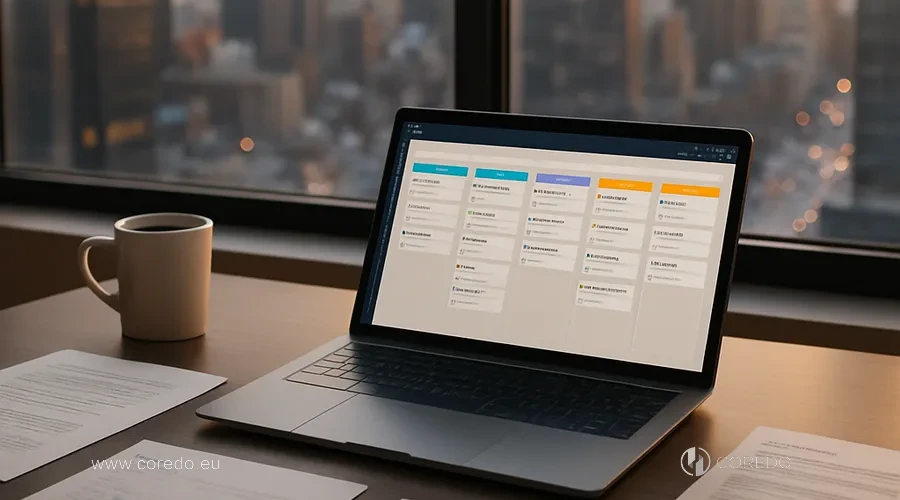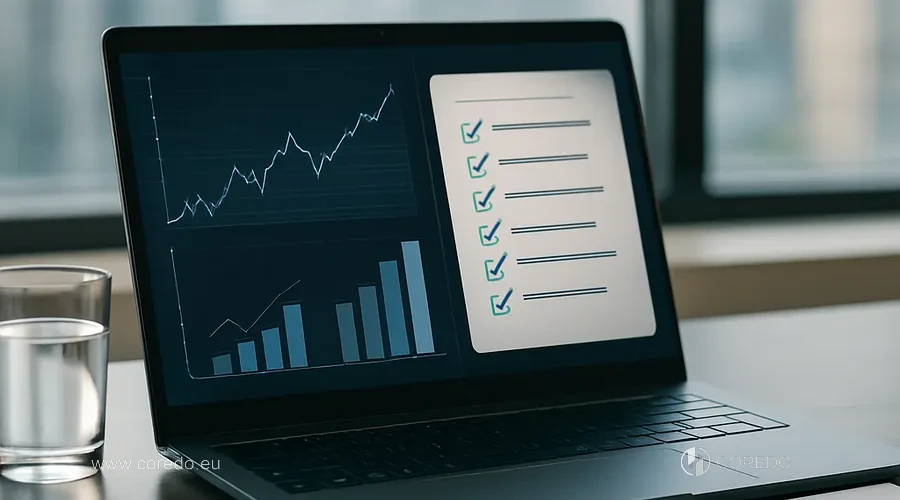Fund administration in private equity real estate is a key element of effective management of investment funds focused on real estate.
Functions of a fund administrator for private equity
In practice the fund administrator takes on:
- Maintaining the investor register and processing transactions
- Calculation and allocation of returns (waterfall provisions, preferred return)
- Preparation and distribution of capital call notices
- Compliance with ILPA standards in reporting for institutional investors
- Monitoring compliance with regulatory requirements (AIFMD, FATCA, SEC compliance)
The solution developed at COREDO for one of the international private equity real estate funds allowed automating the calculation of investors’ true-up percentages and increasing reporting transparency, which became a key factor in attracting new LP.
Administration of a real estate investment fund
Real estate funds are characterized by complex ownership structures, multi-jurisdictional operations and the need to standardize KYC/AML procedures for each participant.
In one case the COREDO team implemented the deployment of a digital platform for a real estate fund, providing automation of middle- and back-office processes and standardization of KYC/AML for investors from the EU and Asia.
Outsourcing fund administration – pros and cons

Outsourcing fund administration is a strategic tool that companies choose to optimize processes and reduce costs, but along with the advantages it also carries certain risks. Before proceeding to analyze the pros and cons for the private equity real estate sector, it is important to understand how outsourcing affects control, efficiency and the security of these operations.
Benefits of outsourcing for private equity real estate
Outsourcing of funds’ administrative functions allows owners and managers to:
- Reduce transaction costs through a flexible payment model and avoiding high fixed costs for in-house staff
- Scale administrative processes during international expansion by using the provider’s global infrastructure
- Quickly implement innovations, modern IT systems, reporting automation, and integration with banking and brokerage platforms
- Ensure SLA (service level agreement) for the speed and quality of report preparation for LP and GP
In one of COREDO’s projects for a real estate fund in Singapore, outsourcing middle- and back-office functions reduced reporting preparation time by 35% and ensured compliance with the new ISSB sustainability standards.
Risks and limitations of outsourcing fund administration
Transferring fund administration functions to an external provider is associated with a number of risks:
- Compliance control: it is necessary to ensure regular monitoring of transactions and prevention of errors, especially in multi-jurisdictional structures
- Investor data cybersecurity: protection of LP and GP information requires implementation of advanced IT solutions and SLA control
- Reduction of reputational risks through outsourcing: choosing a provider with proven expertise and experience working with institutional investors is critical for market trust
- Control over conflicts of interest and institutional due diligence: transparency of procedures and independent verification of assets are key investor requirements
In-house or outsourcing of fund administration
| Criterion | In-house model | Outsourcing fund administration |
|---|---|---|
| Operating costs | High fixed | Flexible, depends on volume |
| Scalability | Limited by resources | High, access to global infrastructure |
| Speed of implementing innovations | Depends on internal IT | Rapid implementation of new technologies |
| Compliance with regulators | Requires internal experts | Provider expertise, regular updates |
| Data leak risks | Control within the company | Requires SLA and provider control |
The experience of lift-out outsourcing of administrative functions implemented by COREDO for a European private equity fund showed: switching to an external fund administrator allowed optimizing costs, speeding up the integration of new regulatory standards and improving the quality of reporting for LP.
What to outsource?

Outsourcing specific tasks allows companies to reduce costs and focus on core areas of the business. Identifying which tasks should be delegated to external specialists is especially important for the effective functioning of middle- and back-office structures. Below we will consider which fund administrator tasks are optimal to outsource.
Middle- and back-office tasks for the fund administrator
COREDO’s practice shows that the following are most effectively outsourced:
- Calculation and distribution of returns (waterfall provisions, preferred return)
- Calculation of true-up interest for investors
- Preparation and distribution of capital call notices
- Automation of reporting and data accuracy control
- Maintaining the investor register, processing transactions, KYC/AML control
For one of COREDO’s clients in the UK, delegating these processes made it possible to fully free up the internal middle- and back-office, focusing resources on investment strategy and risk management.
Technological solutions for fund administration
Modern IT systems: the key to automating fund administration.
- Investor data cybersecurity
- Integration with banking and brokerage systems
- Automation of middle- and back-office processes
- Scalability of administrative functions as the fund grows
In COREDO’s case of automating reporting for a private equity fund in the Czech Republic, integration with banking systems reduced operational errors and accelerated transaction processing by 25%.
Regulatory requirements and reporting

Regulatory requirements and reporting are becoming increasingly complex due to tighter disclosure rules and the standardization of sustainability approaches worldwide. Modern businesses must adapt to international and local regulations to ensure transparency, compliance, and competitiveness. In this context, outsourcing becomes an effective tool for meeting key standards: from ESG and ISSB to specific requirements of the SEC and AIFMD.
Outsourcing for compliance with ESG, ISSB, SEC, AIFMD
Implementing new regulatory standards is one of the main challenges for private equity real estate funds.
- Rapidly adapt to ESG and sustainability disclosure requirements
- Implement ISSB sustainability standards and SEC compliance
- Conduct audits of fund reporting and institutional due diligence according to international standards
- Standardize KYC procedures/AML and transaction monitoring
The COREDO team implemented an AIFMD compliance project for a multi-jurisdictional real estate fund, ensuring process transparency and automation of compliance control.
Reporting standards for institutional investors
Institutional investors demand maximum transparency and standardization of reporting:
- ILPA standards in reporting, a mandatory condition for raising capital
- Customization of reporting to LP requirements
- Independent verification of assets (third-party validation)
- Automation of reporting and institutional due diligence
COREDO’s solution to implement a digital platform for LPs allowed one real estate fund in Estonia to increase investment attractiveness and reduce reporting error risks.
Outsourcing fund administration – how to implement?

Outsourcing fund administration allows companies to focus on business development by delegating specialized tasks to external experts. To successfully implement this strategy and avoid common mistakes, it is important to carefully choose a fund administrator and clearly structure the transition process.
How to choose a fund administrator?
The choice of provider is a strategic decision that affects the fund’s reputation and effectiveness.
- Assess the provider’s experience in your jurisdiction and segment (private equity real estate)
- Check the SLA (service level agreement) – speed, quality, transparency of processes
- Conduct institutional due diligence: audit of IT infrastructure, compliance processes, and risk management practices
- Ensure there is a flexible integration model with banking and brokerage systems
- Request case studies on reducing reputational and operational risks
KPI and outsourcing metrics
To assess the ROI from outsourcing fund administration, the COREDO team uses the following metrics:
- Reduction of transaction costs (%)
- Reporting preparation speed (days/hours)
- Accuracy of NAV and waterfall calculations
- Number of reporting errors (pcs/quarter)
- Level of compliance with regulatory standards (ESG, ISSB, SEC, AIFMD)
- Share of automated middle- and back-office processes
In one of COREDO’s projects, implementing automation achieved an ROI of 180% in the first year through cost optimization and process acceleration.
Capital call, waterfall distribution, compliance: how to organize?
- Use digital platforms for preparing and distributing capital call notices
- Automate the calculation and distribution of returns (waterfall provisions) taking into account preferred return and true-up interest
- Implement compliance control at all stages, from KYC/AML to transaction monitoring and fund reporting audits
- Regularly update procedures for conflicts of interest control and institutional due diligence
Key recommendations for owners and top managers

- Outsourcing fund administration- a strategic tool for reducing transaction costs, optimizing expenses and increasing the fund’s investment attractiveness.
- Scalability of administrative processes through the provider’s global infrastructure allows rapid adaptation to new markets and LP requirements.
- Transparency and standardization of reporting: the key to attracting institutional investors and reducing reputational risks.
- Integration with banking and brokerage systems, automation of middle- and back-office processes: the foundation for effective management of multi-jurisdictional real estate funds.
- Compliance control and adherence to new regulatory standards (ESG, ISSB, SEC, AIFMD) – a necessary condition for the fund’s long-term success.
COREDO offers owners and top managers to use outsourcing as a driver of growth, innovation and increased investor confidence.
Key questions for the business
If you have questions about implementing outsourcing of fund administration, optimizing processes or compliance with new regulatory requirements – the COREDO team is ready to share experience and offer solutions tailored to your tasks.